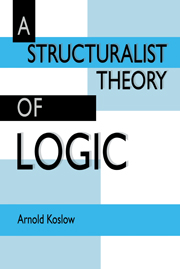Book contents
- Frontmatter
- Contents
- Preface
- Part I Background
- Part II Implication relations
- Part III The logical operators
- Part IV The modal operators
- 25 Introduction
- 26 Modality
- 27 Modals: Existence and nonextensionality
- 28 Special modals
- 29 The possibility of necessity-style modals
- 30 Modals revisited I
- 31 Quantification and modality
- 32 Modals revisited II
- 33 Knowledge, truth, and modality
- 34 The comparative strength of modals
- 35 Kripke-style systematization of the modals without possible worlds
- 36 Model functions, accessibility relations, and theories
- 37 Migrant modals
- Appendix A An implication relation for the integers in the programming language BASIC
- Appendix B Symmetric sequents as products of implication relations and their duals
- Appendix C Component-style logical operators and relevance
- Notes
- Bibliography
- Index
- Frontmatter
- Contents
- Preface
- Part I Background
- Part II Implication relations
- Part III The logical operators
- Part IV The modal operators
- 25 Introduction
- 26 Modality
- 27 Modals: Existence and nonextensionality
- 28 Special modals
- 29 The possibility of necessity-style modals
- 30 Modals revisited I
- 31 Quantification and modality
- 32 Modals revisited II
- 33 Knowledge, truth, and modality
- 34 The comparative strength of modals
- 35 Kripke-style systematization of the modals without possible worlds
- 36 Model functions, accessibility relations, and theories
- 37 Migrant modals
- Appendix A An implication relation for the integers in the programming language BASIC
- Appendix B Symmetric sequents as products of implication relations and their duals
- Appendix C Component-style logical operators and relevance
- Notes
- Bibliography
- Index
Summary
The loss of modal character
On our account, one may sometimes come across operators that seem to have modal character, but do not distribute over implication. Indeed, one may, to take a parallel example, come across hypotheticals that do not seem to satisfy the condition that corresponds to modus ponens. How is this possible? It is one of our conditions on the modals that they distribute over implication, and it is part of our conditions on hypothetical operators that A, A → B ⇒ B.
The answer lies in the recognition that modal operators as well as the logical operators are relativized to implication relations. That feature is an integral part of our account, and one of its deepest resources. A structure consists of a base set A, with an implication relation on it. There can, as we have seen, be various implication relations on a given set. However, with, say, two implication relations on a given set, the possibility arises that an operator may be modal with respect to one implication relation, but fail to be modal with respect to the other. Similarly, an operator may be a hypothetical with respect to one implication relation, but not with respect to another over the very same set. The result of this shift from one implication relation to another can be dramatic: Modus ponens will seem to fail in the case of hypotheticals, and modals will seem to violate the conditions even of monotonicity [if A ⇒ B, then φ(A) ⇒ φ(B)], or even seem to fail to be classical [if A ⇔ B, then φ(A) ⇔ φ(B)].
- Type
- Chapter
- Information
- A Structuralist Theory of Logic , pp. 368 - 372Publisher: Cambridge University PressPrint publication year: 1992



